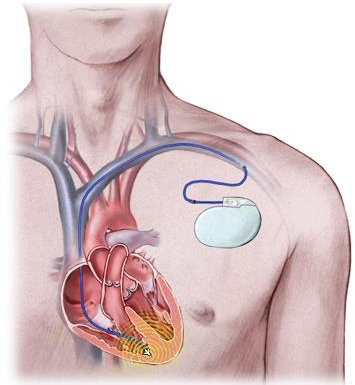While medical treatment for arrhythmias offer limited outcomes, Implantable Cardioverter Defibrillators (ICD) have become a popular treatment option for preventing sudden death in patients with cardiac problems. FV Hospital’s Cardiology Department has successfully provided ICD implants to patients with a high risk of cardiac arrest.
As arrhythmias occur, patients often suffer unexpected fainting episodes and are exposed to very high risk of life-threatening cardiac arrest. Arrhythmias require timely medical care as consequences can be fatal. ICDs correct abnormal heartbeats and offer salvation for people with dangerous arrhythmias.
Mr. T.K.L, 45, living in District 9, HCMC, was admitted to FV Hospital’s Cardiology with low blood pressure, a hard-to-detect pulse and drowsiness. This patient had a history of cardiac arrest, coronary artery stent placement and weak heart pumping function. At that time, his ventricular tachycardia was measured at 220 beats per minute while his normal heart rhythm ranged from 60 to 80 beats per minute. This dangerous arrhythmia could have lead to death due to a heart attack.
The patient was given cardio resuscitation to restore his normal heart rate. Head of Cardiology Dr Tran Nhan Tuan and Dr Nguyen Thai Binh Son, both specialists in cardiac electrophysiology and pacing, recommended Mr T.K.L have an ICD implant. ICD implants are a safe and effective treatment for preventing sudden death due to dangerous arrhythmias.

The ICD device is placed under the chest skin, immediately beneath the collarbone of the patient, and connected directly to their heart with a wire. The ICD monitors the electric activities of the patient’s heart. If an abnormal heart rhythm is detected, the ICD device analyses the rhythm and delivers an electric shock at tens of joules for 15 to 20 seconds to restore a normal heartbeat. If the heart is beating too slowly due to cardiotonic drugs, this device can also send a “trigger” to speed up the heart rate.
Because the key function of an ICD device is to restore a normal heart beat for a patient suffering from life-threatening arrhythmias, it is very helpful in minimising cases of sudden cardiac death due to sudden heart failure caused by dangerous arrhythmias (i.e. ventricular fibrillation, ventricular tachycardia).
Patients with a high risk of sudden cardiac death, for example those with myocardial infarction, coronary artery diseases, irregular contraction, history of fainting, arrhythmias and family history of sudden cardiac death,. should consider this treatment.
ICD implant surgery must be performed at a high-tech cardiology centre by cardiologists specialised in cardiac pacing. It is important for doctors to make the right indication, perform the surgery precisely and continue monitoring patients with an ICD. Patients with an ICD device need to maintain a schedule of follow-up visits to ensure that their device is operating effectively, as recommended by their doctors. Patients with ICDs can enjoy normal daily activities, eat a normal diet and exercise like people without ICDs, but need specific instructions when using electric devices or passing through airport security.



